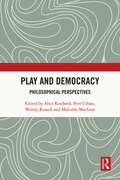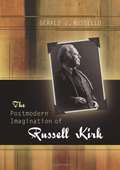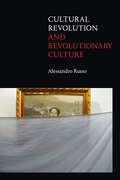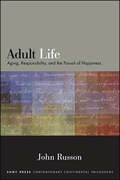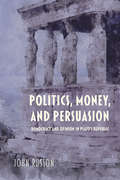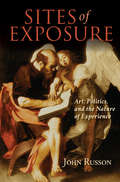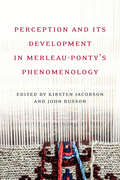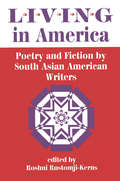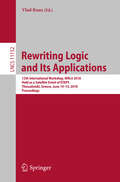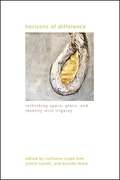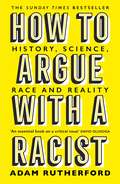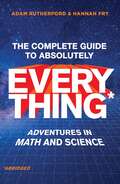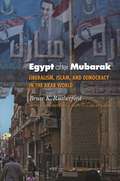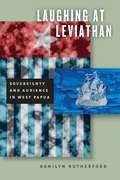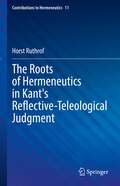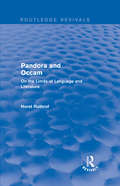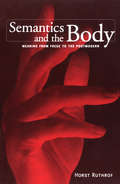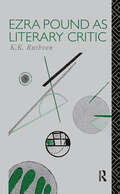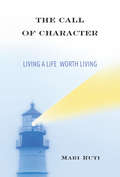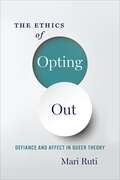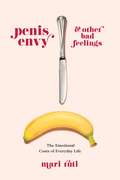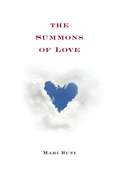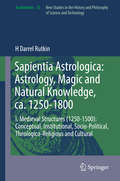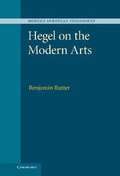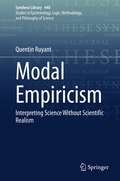- Table View
- List View
Play and Democracy: Philosophical Perspectives
by Wendy Russell Malcolm MacLean Petr Urban Alice KoubováThis book explores the complex and multi-layered relationships between democracy and play, presenting important new theoretical and empirical research. It builds new paradigmatic bridges between philosophical enquiry and fields of application across the arts, political activism, children’s play, education and political science. Play and Democracy addresses four principal themes. Firstly, it explores how the relationship between play and democracy can be conceptualized and how it is mirrored in questions of normativity, ethics and political power. Secondly, it examines different aspects of play in urban spaces, such as activism, aesthetic experience, happenings, political carnivals and performances. Thirdly, it offers examples and analyses of how playful artistic performances can offer democratic resistance to dominant power. And finally, it considers the paradoxes of play in both developing democratic sensibilities and resisting power in education. These themes are explored and interrogated in chapters covering topics such as aesthetic practice, pedagogy, diverse forms of activism, and urban experience, where play and playfulness become arenas in which to create the possibility of democratic practice and change. Adding extra depth to our understanding of the significance of play as a political, cultural and social power, this book is fascinating reading for any serious student or researcher with an interest in play, philosophy, politics, sociology, arts, sport or education.
The Postmodern Imagination of Russell Kirk
by Gerald J. RusselloExamines such concepts of Russell Kirk's thought as imagination, historical consciousness, the interplay between the individual and tradition, and the role of narrative in constructing individual and societal identity. Focuses on Kirk's role in the development of the new conservatism of the 1950s and 1960s and his critique of modernity.
Cultural Revolution and Revolutionary Culture
by Alessandro RussoIn Cultural Revolution and Revolutionary Culture, Alessandro Russo presents a dramatic new reading of China's Cultural Revolution as a mass political experiment aimed at thoroughly reexamining the tenets of communism. Russo explores four critical phases of the Cultural Revolution, each with its own reworking of communist political subjectivity: the historical-theatrical “prologue” of 1965; Mao's attempts to shape the Cultural Revolution in 1965 and 1966; the movements and organizing between 1966 and 1968 and the factional divides that ended them; and the mass study campaigns from 1973 to 1976 and the unfinished attempt to evaluate the inadequacies of the political decade that brought the Revolution to a close. Among other topics, Russo shows how the dispute around the play Hai Rui Dismissed from Office was not the result of a Maoist conspiracy, but rather a series of intense and unresolved political and intellectual controversies. He also examines the Shanghai January Storm and the problematic foundation of the short-lived Shanghai Commune. By exploring these and other political-cultural moments of Chinese confrontations with communist principles, Russo overturns conventional wisdom about the Cultural Revolution.
Adult Life: Aging, Responsibility, and the Pursuit of Happiness (SUNY series in Contemporary Continental Philosophy)
by John RussonWhat does it mean to be an adult? In this original and compelling work, John Russon answers that question by leading us through a series of rich reflections on the psychological and social dimensions of adulthood and by exploring some of the deepest ethical and existential issues that confront human life: intimacy, responsibility, aging, and death. Using his knowledge of the history of philosophy along with the combined resources of psychology, sociology, and anthropology, he explores the behavioral challenges of becoming an adult and examines the intimate relationships that are integral to healthy development. He also studies our experiences of time and space, which address both aging and the crucial role that our material environments play in the formation of our personalities. Of special note is Russon's provocative assessment of the economic and political contexts of contemporary adult life and the distinctive problems they pose. Engaging and accessible, Adult Life is for anyone seeking the profound lessons our human culture has learned about living well.
Politics, Money, and Persuasion: Democracy and Opinion in Plato's Republic (Studies in Continental Thought)
by John RussonIn Politics, Money, and Persuasion, distinguished philosopher John Russon offers a new framework for interpreting Plato's The Republic. For Russon, Plato's work is about the distinctive nature of what it is to be a human being and, correspondingly, what is distinctive about the nature of human society. Russon focuses on the realities of our everyday experience to come to profoundly insightful assessments of our human realities: the nature of the city, the nature of knowledge, and the nature of human psychology. Russon's argument concentrates on the ambivalence of logos, which includes reflections on politics and philosophy and their place in human life, how humans have shaped the environment, our interactions with money, the economy, and the pursuit of the good in social and political systems. Politics, Money, and Persuasion offers a deeply personal but also practical kind of philosophical reading of Plato's classic text. It emphasizes the tight connection between the life of city and the life of the soul, demonstrating both the crucial role that human cognitive excellence and psychological health play in political and social life.
Sites of Exposure: Art, Politics, and the Nature of Experience
by John RussonJohn Russon draws from a broad range of art and literature to show how philosophy speaks to the most basic and important questions in our everyday lives. In Sites of Exposure, Russon grapples with how personal experiences such as growing up and confronting death combine with broader issues such as political oppression, economic exploitation, and the destruction of the natural environment to make life meaningful. His is cutting-edge philosophical work, illuminated by original and rigorous thinking that relies on cross-cultural communication and engagement with the richness of human cultural history. These probing interpretations of the nature of phenomenology, the philosophy of art, history, and politics, are appropriate for students and scholars of philosophy at all levels.
Perception and its Development in Merleau-Ponty's 'Phemenology'
by John Russon Kirsten JacobsonFrench phenomenologist Maurice Merleau-Ponty (1908–1961) shifted the terrain of western philosophy when he identified the body, rather than consciousness, as the primary site of our meaningful engagement with the world. His magnum opus, The Phenomenology of Perception (1945), revolutionized work in philosophy, psychology, cognitive science and other fields. Perception and Its Development in Merleau-Ponty’s Phenomenology brings together essays from fifteen leading Merleau-Ponty scholars to demonstrate the continuing significance of Merleau-Ponty’s analysis. Mirroring the progression found in Merleau-Ponty's Phenomenology of Perception, the essays in this volume engage in original phenomenological research to demonstrate the dynamic development of perceptual life from perception's most foundational forms (spatiality, temporality, intentionality, etc.) to its richest articulations in political life and artistic activity. This comprehensive volume is a powerful resource for students and scholars alike studying Merleau-Ponty’s philosophy and serves both as a commentary upon and companion to his The Phenomenology of Perception.
Living In America: Poetry And Fiction By South Asian American Writers
by Roshni Rustomji-KernsPerceptions and realities of life in North America are interwoven with memories of South Asia in this anthology of literary works focusing on South Asian American perspectives on the United States and Canada. Most of the short stories and poems deal explicitly with South Asian American experiences.
Rewriting Logic and Its Applications: 12th International Workshop, Wrla 2018, Held As A Satellite Event Of Etaps, Thessaloniki, Greece, June 14-15, 2018, Proceedings (Lecture Notes in Computer Science #11152)
by Vlad RusuThis book constitutes revised selected papers from the 12th International Workshop on Rewriting Logic and Its Applications, WRLA 2018, held in Thessaloniki, Greece, in June 2018. The 12 full papers presented in this volume were carefully reviewed and selected from 21 submissions. They deal with rewriting, a natural model of computation and an expressive semantic framework for concurrency, parallelism, communication, and interaction, and its applications.
Horizons of Difference: Rethinking Space, Place, and Identity with Irigaray (SUNY series in Gender Theory)
by Ruthanne Crapo Kim; Yvette Russell; Brenda SharpHorizons of Difference offers twelve original essays inspired by Luce Irigaray's complex, nuanced critique of Western philosophy, culture, and metaphysics, and her call to rethink our relationship to ourselves and the world through sexuate difference. Contributors engage urgent topics in a range of fields, including trans feminist theory, feminist legal theory, film studies, critical race theory, social-political theory, philosophy of religion, environmental ethics, philosophical aesthetics, and critical pedagogy. In so doing, they aim to push the scope of Irigaray's work beyond its horizon. Horizons of Difference seeks conversations that Irigaray herself has yet to fully consider and explores areas that stretch the limits of the notion of sexuate difference itself. Sexuate difference is a unifying mode of thought, bringing disparate disciplines and groups together. Yet it also resists unification in demanding that we continually rethink the basic coordinates of space, place, and identity. Ultimately, Horizons of Difference insists that the fragmented, wounded subjectivities within the dominant regime of masculine sameness can inform how we negotiate space, find place, and transform identity.
How to Argue With a Racist: History, Science, Race and Reality
by Adam RutherfordTHE SUNDAY TIMES BESTSELLER'Nobody deals with challenging subjects more interestingly and compellingly than Adam Rutherford, and this may be his best book yet. This is a seriously important work' BILL BRYSON'A fascinating and timely refutation of the casual racism on the rise around the world. The ultimate anti-racism guide for data-lovers everywhere' CAROLINE CRIADO PEREZ ***Race is real because we perceive it. Racism is real because we enact it. But the appeal to science to strengthen racist ideologies is on the rise - and increasingly part of the public discourse on politics, migration, education, sport and intelligence. Stereotypes and myths about race are expressed not just by overt racists, but also by well-intentioned people whose experience and cultural baggage steer them towards views that are not supported by the modern study of human genetics. Even some scientists are uncomfortable expressing opinions deriving from their research where it relates to race. Yet, if understood correctly, science and history can be powerful allies against racism, granting the clearest view of how people actually are, rather than how we judge them to be.HOW TO ARGUE WITH A RACIST is a vital manifesto for a twenty-first century understanding of human evolution and variation, and a timely weapon against the misuse of science to justify bigotry.
The Complete Guide to Absolutely Everything (Abridged) (Abridged) (Abridged) (Abridged): Adventures in Math and Science: Adventures In Math And Science
by Adam Rutherford Hannah FryThe complete story of the universe and absolutely everything in it (minus the boring parts). Despite our clever linguistic abilities, humans are spectacularly ill-equipped to comprehend what’s happening in the universe. Our senses and intuition routinely mislead us. The Complete Guide to Absolutely Everything (Abridged) tells the story of how we came to suppress our monkey minds and perceive the true nature of reality. Written with wit and humor, this brief book tells the story of science—tales of fumbles and missteps, errors and egos, hard work, accidents, and some really bad decisions—all of which have created the sum total of human knowledge. Geneticist Adam Rutherford and mathematician Hannah Fry guide readers through time and space, through our bodies and brains, showing how emotions shape our view of reality, how our minds tell us lies, and why a mostly bald and curious ape decided to begin poking at the fabric of the universe. Rutherford and Fry shine as science sleuths, wrestling with some truly head-scratching questions: Where did time come from? Do we have free will? Does my dog love me? Hilarious sidebars present memorable scientific oddities: for example, hypnotized snails, human-sized ants, and the average time it takes most animals to evacuate their bladders. (A surprisingly consistent twenty-one seconds, if you must know.) Both rigorous and playful, The Complete Guide to Absolutely Everything (Abridged) is a celebration of the weirdness of the cosmos, the strangeness of humans, and the joys and follies of scientific discovery.
Egypt after Mubarak: Liberalism, Islam, and Democracy in the Arab World (Princeton Studies in Muslim Politics #48)
by Bruce K. RutherfordWhich way will Egypt go now that Husni Mubarak's authoritarian regime has been swept from power? Will it become an Islamic theocracy similar to Iran? Will it embrace Western-style liberalism and democracy? Egypt after Mubarak reveals that Egypt's secularists and Islamists may yet navigate a middle path that results in a uniquely Islamic form of liberalism and, perhaps, democracy. Bruce Rutherford draws on in-depth interviews with Egyptian judges, lawyers, Islamic activists, politicians, and businesspeople. He utilizes major court rulings, political documents of the Muslim Brotherhood, and the writings of Egypt's leading contemporary Islamic thinkers. Rutherford demonstrates that, in post-Mubarak Egypt, progress toward liberalism and democracy is likely to be slow. Essential reading on a subject of global importance, this edition includes a new introduction by Rutherford that takes stock of the Arab Spring and the Muslim Brotherhood's victories in the 2011-2012 elections.
Laughing at Leviathan: Sovereignty and Audience in West Papua
by Danilyn RutherfordFor West Papua and its people, the promise of sovereignty has never been realized, despite a long and fraught struggle for independence from Indonesia. In Laughing at Leviathan, Danilyn Rutherford examines this struggle through a series of interlocking essays that drive at the core meaning of sovereignty itself--how it is fueled, formed, and even thwarted by pivotal but often overlooked players: those that make up an audience. Whether these players are citizens, missionaries, competing governmental powers, nongovernmental organizations, or the international community at large, Rutherford shows how a complex interplay of various observers is key to the establishment and understanding of the sovereign nation-state. Drawing on a wide array of sources, from YouTube videos to Dutch propaganda to her own fieldwork observations, Rutherford draws the history of Indonesia, empire, and postcolonial nation-building into a powerful examination of performance and power. Ultimately she revises Thomas Hobbes, painting a picture of the Leviathan not as a coherent body but a fragmented one distributed across a wide range of both real and imagined spectators. In doing so, she offers an important new approach to the understanding of political struggle.
The Roots of Hermeneutics in Kant's Reflective-Teleological Judgment (Contributions to Hermeneutics #11)
by Horst RuthrofThis book challenges the standard view that modern hermeneutics begins with Friedrich Ast and Friedrich Schleiermacher, arguing instead that it is the dialectic of reflective and teleological reason in Kant’s Critique of Judgment that provides the actual proto-hermeneutic foundation. It is revolutionary in doing so by replacing interpretive truth claims by the more appropriate claim of rendering opaque contexts intelligible. Taking Gadamer’s comprehensive analysis of hermeneutics in Truth and Method (1960) as its point of departure, the book turns to Kant’s Critiques, reviewing his major concepts as a coherent system in relation to his sensus communis. At the heart of the book is the interaction between reflective, bottom-up search and teleological, top-down interpretative projection as provided in Part II of the third Critique. This text contends that Kant’s broad definition of nature invites the liberation of the reflective-teleological judgment from its biological exemplifications and so permits us to establish its generalised status as a path-breaking, methodological tool. Kant’s dialectic of reflective search and meaning bestowing, stipulated teleology is asserted to anticipate a series of motifs commonly associated with hermeneutics. Figures covered include Dilthey, Husserl, Ingarden, Heidegger, Gadamer, Apel, Habermas, Ricoeur, Derrida, Foucault, Lyotard, Deleuze, Vattimo, Nancy and Caputo. Their collective contributions to interpretation allow for a review of the evolution of hermeneutics from the perspective of the Kantian critique of the limitations of human cognition. The book is written for the informed, general reader, but will likewise appeal to advanced undergraduate and graduate students as well as researchers in the humanities and social sciences.
Routledge Revivals: On the Limits of Language and Literature (Routledge Revivals)
by Horst RuthrofFirst published in 1992, this book evokes Pandora and Occam as metaphoric corner posts in an argument about language as discourse and in doing so, brings analytic philosophy to bear on issues of Continental philosophy, with attention to linguistic, semiological, and semiotic concerns. Instead of regarding meanings as guaranteed by definitions, the author argues that linguistic expressions are schemata directing us more or less loosely toward the activation of nonlinguistic sign systems. Ruthrof draws up a heuristic hierarchy of discourses, with literary expression at the top, descending through communication-reduced reference and speech acts to formal logic and digital communication at the bottom. The book offers multiple perspectives from which to review traditional theories of meaning, working from a wide variety of theorists, including Peirce, Frege, Husserl, Derrida, Lyotard, Davidson, and Searle. In Ruthrof’s analysis, Pandora and Occam illustrate the opposition between the suppressed rich materiality of culturally saturated discourse and the stark ideality of formal sign systems. This book will be of interest to those studying linguistics, literature and philosophy.
Semantics and the Body: Meaning from Frege to the Postmodern
by Horst RuthrofIn traditional semantics, the human body tends to be ignored in the process of constructing meaning. Horst Ruthrof argues, by contrast, that the body is an integral part of this hermeneutic activity. Strictly language-based theories, and theories which conflate formal and natural languages, run into problems when they describe how we communicate in cultural settings. Semantics and the Body proposes that language is no more than a symbolic grid which does not signify at all unless it is brought to life by non-linguistic signs.Ruthrof reviews and analyses various 'orthodox' theories of meaning, from the views of Gottlob Frege at the beginning of the twentieth century to those of theorists in the postmodern period, then offers an alternative approach of his own. His theory features 'corporeal semantics,' and holds that meaning has ultimately to do with the body and that the meaning of linguistic expressions is indeterminate without the aid of visual, tactile, olfactory, and other bodily signs. This approach also remedies what Ruthrof sees also as a loss of interpretive will in the postmodern era.Pedagogy in many fields could be enriched by a systemic integration of non-verbal semiosis into the linguistically dominated syllabus. Those involved in discourse analysis, literature, art criticism, film theory, pedagogy, and philosophy will find the implications of Ruthrof's study considerable.
Ezra Pound as Literary Critic (Critics of the Twentieth Century)
by Emeritus Professor Ruthven K. K. RuthvenBringing some of the insights of modern critical theory to bear on a great deal of information about Pound's activities as a literary critic (some of it made available only recently), K.K. Ruthven provides a provocative re-reading of a major modernist writer who dominated the discourse of modernism.
The Call of Character: Living a Life Worth Living
by Mari RutiShould we feel inadequate when we fail to be healthy, balanced, and well-adjusted? Is it realistic or even desirable to strive for such an existential equilibrium? Condemning our current cultural obsession with cheerfulness and "positive thinking," Mari Ruti calls for a resurrection of character that honors our more eccentric frequencies and argues that sometimes a tormented and anxiety-ridden life can also be rewarding. Ruti critiques the search for personal meaning and pragmatic attempts to normalize human beings' unruly and idiosyncratic natures. Exposing the tragic banality of a happy life commonly lived, she instead emphasizes the advantages of a lopsided life rich in passion and fortitude. She also shows what matters is not our ability to evade existential uncertainty but our courage to meet adversity in such a way that we do not become irrevocably broken. We are in danger of losing the capacity to cope with complexity, ambiguity, melancholia, disorientation, and disappointment, Ruti warns, leaving us feeling less "real" and less connected and unable to process a full range of emotions. Heeding the call of our character means acknowledging the marginalized, chaotic aspects of our being, and it is precisely these creative qualities that make us inimitable and irreplaceable.
The Ethics of Opting Out: Queer Theory's Defiant Subjects
by Mari RutiIn The Ethics of Opting Out, Mari Ruti provides an accessible yet theoretically rigorous account of the ideological divisions that have animated queer theory during the last decade, paying particular attention to the field's rejection of dominant neoliberal narratives of success, cheerfulness, and self-actualization. More specifically, she focuses on queer negativity in the work of Lee Edelman, Jack Halberstam, and Lynne Huffer, and on the rhetoric of bad feelings found in the work of Sara Ahmed, Lauren Berlant, David Eng, Heather Love, and José Muñoz. Ruti highlights the ways in which queer theory's desire to opt out of normative society rewrites ethical theory and practice in genuinely innovative ways at the same time as she resists turning antinormativity into a new norm. This wide-ranging and thoughtful book maps the parameters of contemporary queer theory in order to rethink the foundational assumptions of the field.
Penis Envy and Other Bad Feelings: The Emotional Costs of Everyday Life
by Mari RutiMari Ruti combines theoretical reflection, cultural critique, feminist politics, and personal experience to analyze the prevalence of bad feelings in contemporary everyday life. Proceeding from a playful engagement with Freud’s idea of penis envy, Ruti’s autotheoretical commentary fans out to a broader consideration of neoliberal pragmatism. She focuses on the emphasis on good performance, high productivity, constant self-improvement, and relentless cheerfulness that characterizes present-day Western society. Revealing the treacherousness of our fantasies of the good life, particularly the idea that our efforts will eventually be rewarded—that things will eventually get better—Ruti demystifies the false hope that often causes us to tolerate an unbearable present.Theoretically rigorous and lucidly written, Penis Envy and Other Bad Feelings is a trenchant critique of contemporary gender relations. Refuting the idea that we live in a postfeminist world where gender inequalities have been transcended, Ruti describes how neoliberal heteropatriarchy has transformed itself in subtle and stealthy, and therefore all the more insidious, ways. Mobilizing Michel Foucault’s concept of biopolitics, Jacques Lacan’s account of desire, and Lauren Berlant’s notion of cruel optimism, she analyzes the rationalization of intimacy, the persistence of gender stereotypes, and the pornification of heterosexual culture. Ruti shines a spotlight on the depression, anxiety, frustration, and disenchantment that frequently lie beneath our society’s sugarcoated mythologies of self-fulfillment, romantic satisfaction, and professional success, speaking to all who are concerned about the emotional costs of the pressure-cooker ethos of our age.
The Summons of Love
by Mari RutiWe are conditioned to think that love heals wounds, makes us happy, and gives our lives meaning. When the opposite occurs and love causes fracturing, disenchantment, and existential turmoil, we suffer deeply, especially if we feel that love has failed us or that we have failed to experience what others seem so effortlessly to enjoy. In this eloquently argued, psychologically informed book, Mari Ruti portrays love as a much more complex, multifaceted phenomenon than we tend to appreciate—an experience that helps us encounter the depths of human existence. Love's ruptures are as important as its triumphs, and sometimes love succeeds because it fails. At the heart of Ruti's argument is a meditation on interpersonal ethics that acknowledges the inherent opacity of human interiority and the difficulty of taking responsibility for what we cannot fully understand. Yet the fact that humans are often irrational in love does not absolve us of ethical accountability. In Ruti's view, we must work harder to map the unconscious patterns motivating our romantic behavior. As opposed to popular spiritual approaches urging us to live fully in the now, Ruti treats the past as a living component of the present. Only when we catch ourselves at those moments when the past speaks in the present can we keep ourselves from hurting the ones we love. Equally important, Ruti emphasizes transcending our individual histories of pain, an act that allows us to face the unconscious demons that dictate our relational choices. Written with substance and compassion, The Summons of Love restores the enlivening and transformative possibilities of romance.
Sapientia Astrologica: I. Medieval Structures (1250-1500): Conceptual, Institutional, Socio-Political, Theologico-Religious and Cultural (Archimedes #55)
by H Darrel RutkinThis book explores the changing perspective of astrology from the Middle Ages to the Early Modern Era. It introduces a framework for understanding both its former centrality and its later removal from legitimate knowledge and practice. The discussion reconstructs the changing roles of astrology in Western science, theology, and culture from 1250 to 1500. The author considers both the how and the why. He analyzes and integrates a broad range of sources. This analysis shows that the history of astrology—in particular, the story of the protracted criticism and ultimate removal of astrology from the realm of legitimate knowledge and practice—is crucial for fully understanding the transition from premodern Aristotelian-Ptolemaic natural philosophy to modern Newtonian science. This removal, the author argues, was neither obvious nor unproblematic. Astrology was not some sort of magical nebulous hodge-podge of beliefs. Rather, astrology emerged in the 13th century as a richly mathematical system that served to integrate astronomy and natural philosophy, precisely the aim of the “New Science” of the 17th century. As such, it becomes a fundamentally important historical question to determine why this promising astrological synthesis was rejected in favor of a rather different mathematical natural philosophy—and one with a very different causal structure than Aristotle's.
Hegel on the Modern Arts
by Benjamin RutterDebates over the 'end of art' have tended to obscure Hegel's work on the arts themselves. Benjamin Rutter opens this study with a defence of art's indispensability to Hegel's conception of modernity; he then seeks to reorient discussion toward the distinctive values of painting, poetry, and the novel. Working carefully through Hegel's four lecture series on aesthetics, he identifies the expressive possibilities particular to each medium. Thus, Dutch genre scenes animate the everyday with an appearance of vitality; metaphor frees language from prose; and Goethe's lyrics revive the banal routines of love with imagination and wit. Rutter's important study reconstructs Hegel's view not only of modern art but of modern life and will appeal to philosophers, literary theorists, and art historians alike.
Modal Empiricism: Interpreting Science Without Scientific Realism (Synthese Library #440)
by Quentin RuyantThis book proposes a novel position in the debate on scientific realism: Modal Empiricism. Modal empiricism is the view that the aim of science is to provide theories that correctly delimit, in a unified way, the range of experiences that are naturally possible given our position in the world. The view is associated with a pragmatic account of scientific representation and an original notion of situated modalities, together with an inductive epistemology for modalities. It purports to provide a faithful account of scientific practice and of its impressive achievements, and defuses the main motivations for scientific realism. More generally, Modal Empiricism purports to be the precise articulation of a pragmatist stance towards science.This book is of interest to any philosopher involved in the debate on scientific realism, or interested in how to properly understand the content, aim and achievements of science.
